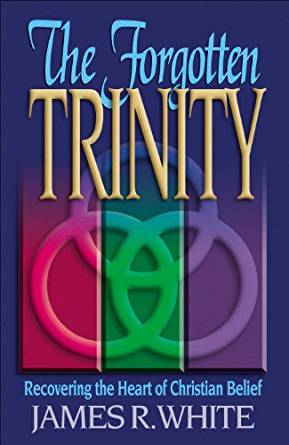|
Listen to this post:
|
As with many standard, constantly recycled moves in apologetics, I don’t know where this sort of retort originated, or how far back it goes in catholic thinking. (I would imagine that some version of it goes very far back.) I’ll just focus on one recent spreader of it, Stevie-Wonder-trophy-winner Dr. James White.

In this passage from his book The Forgotten Trinity, White has just insisted that in John 20:28-29, the author is teaching that Jesus is the one God. (This should be challenged, but let’s let that go for now.) White realizes that an obvious reason not to read John that way is that in the very same chapter (John 20:17) Jesus confesses that someone else, his Father, is his god, and our god (and given the Jewish context and the rest of this gospel, this must be the unique God).
White replies,
Remember the maxim: Difference in function does not indicate inferiority in nature.
The Forgotten Trinity, p. 70.
Here White is gesturing at the catholic tradition that Father and Son are equally divine. (Though the Son operates subject to the Father, still they have the same divine nature.)
But how does this address either problem highlighted in part 1? It looks like it just ignores both problems, and changes the subject back to a time-honored creedal tradition.
The general point, I think, is true. If an employee functions under his boss, or a wife is in some sense subject to her husband – still, all involved are equally human beings, all selves with “human nature” (whether this be a universal property, a concept, or a type of individual property). But this is an irrelevant truth, when it comes to the problems at hand.

Never mind the general point; anyway, in the case of Yahweh, he is assumed to be subject to no god. So then, someone who is subject to a god can’t be him.
And if the Father and Son being homoousion implies that they’re the same god (as most trinitarians will agree), then it seems that neither should be god over the other, as just conceptually, no god can be the god over himself. Jesus says here that the Father is his god, and so a competent reader should infer that Jesus is not supposed to be that same god.
So far Dr. White has only given a snappy comeback that utterly misses the point.
This initial reply of his would be to the point if someone were arguing: “Jesus must be inferior to the Father in nature, because Jesus functions differently than the Father, and in general, difference of function indicates inferiority of nature.” But who on earth would argue that?
But White is just getting warmed up. Next time, the “Jesus as atheist?!” bit.

I have found that Trinitarians will say that the Father is the god of Jesus only in so far as Jesus is a human being. God the Son, they say, however, has no god. So we are left with a Jesus who, inexplicably, is sometimes speaking as a human being and sometimes speaking as God. By means of this alleged division between Jesus’ natures (which the texts are utterly disinterested in explaining or even mentioning) Trinitarians can brilliantly answer any challenge to against Jesus’ deity.
To truly convince them I believe Biblical exegesis is not enough; I think we have to get to the sentiments behind why they cannot fathom or tolerate a merely human Jesus. For Trinitarians ideologically on the left, their tolerant Jesus must be God in order to adequately discredit the intolerant God of the Old Testament. For Trinitarians ideologically on the right, their sinless Jesus must serve as an eternal sacrifice for the sins of humanity.
To convince evangelicals then, the only way forward in my view is to either reformulate atonement theory in a more historical and less metaphysical way or to demonstrate how a merely human Jesus is capable of bearing the weight of substitutionary atonement.
Thanks for your interesting comments. About your 2nd and 3rd paragraphs – yes, I think atonement is central to how many think about christology, and far to many are saddle with the unexamined assumption that only God or a divine Person could atone. No support for that in the Bible! About your first paragraph – those analytic theologians who defend “compositional Christology” do more than fake it here. They have a divine nature which has no god and a human nature which is under a god. Check out my Tim Pawl interviews for this sort of Incarnation theory. It comes at a high price though, in my view!
Not only is the proposition not articulated in the New Testament, it is quite fascinating to see the first century Jewish work known as 4 Maccabees discuss atonement in relation to the fully-human Jewish martyrs.
“‘You know, O God, that though I might have saved myself, I am dying in burning torments for the sake of the law. Be merciful to your people, and let our punishment suffice for them. Make my blood their purification, and take my life in exchange for theirs’” (4 Macc 6:27-29).
“The [Jewish martyrs], then, who have been consecrated for the sake of God, are honored, not only with this honor, but also by the fact that because of them our enemies did not rule over our nation, the tyrant was punished, and the homeland purified—they having become, as it were, a ransom for the sin of our nation. And through the blood of those devout ones and their death as an atoning sacrifice, divine Providence preserved Israel that previously had been mistreated” (4 Macc 17:20-22).
Hi Dale,
Your comment, “far to many are saddle with the unexamined assumption that only God or a divine Person could atone. No support for that in the Bible,” was one of the main reasons why I left Oneness and became a Unitarian Monotheist. It was commonly taught in Oneness that only the blood of God could atone for “all” of the sins of mankind, since the blood of God alone is of *infinite* value. Thus Jesus had to be God, as well as Man. If he were only a sinless man, then his blood could perhaps have atoned for one ‘other’ person, but not for all of mankind. The problem with this argument is that nowhere is this taught or declared in the NT. Nowhere in the NT do we ever read of where Jesus’ supposed *deity* was sacrificed for us. Indeed, 1 Tim 2:5-6 makes it clear that it was “the man Christ Jesus,” not the “One God,” who atoned for the sins of all mankind.
If the blood of animal sacrifices could temporarily take away (cover) sins in the OT, then why should it be thought impossible to believe that God could use the death of one sinless man to permanently eradicate our sins. Was the reason why animal sacrifices were unable to permanently deal with sins in the OT because they were not God-incarnate or because they were not made in the “image of man”? Obviously the latter, not the former. Hence why Jesus is identified in scripture as the “last Adam” and the “second man,” not the “first God-Man.”
Comments are closed.